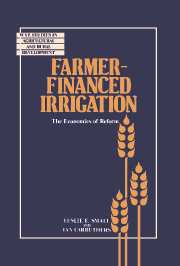Part I - Analysing financing policies: theory and concepts
Published online by Cambridge University Press: 05 November 2011
Summary
Our analysis of financing policies is grounded in the conceptual framework provided by economic theory. In the following two chapters, we provide an overview of the key theoretical elements and concepts upon which our analysis is based.
Chapter 2, written particularly for non-economists and students of economics, introduces a few key concepts from neoclassical economic theory. We do not attempt a thorough and rigorous presentation of these concepts; rather our purpose is to identify the essence of their theoretical insights so as to make apparent their practical utility in the analysis of irrigation financing policies.
In Chapter 3 we develop a conceptual framework for examining irrigation financing policies. After characterising the myriad of financing methods into a few basic types, we use the concepts of economic efficiency and equity to identify five criteria for evaluating the desirability of alternative financing policies. Finally, we examine how a key institutional factor – the presence or absence of financial autonomy in the agencies responsible for operating the irrigation facilities – affects the likely outcomes of financing policies.
From the theory and concepts presented in these two chapters, we arrive at several conclusions relating to irrigation financing policies that colour much of the rest of the book. These conclusions are (1) that user fees implemented by financially autonomous irrigation agencies often have many advantages over other types of financing arrangements; (2) that most of the advantages of user fees are lost in the absence of financial autonomy; and (3) that there is no single ‘best’ financing policy for all situations.
- Type
- Chapter
- Information
- Farmer-Financed IrrigationThe Economics of Reform, pp. 14 - 15Publisher: Cambridge University PressPrint publication year: 1991

